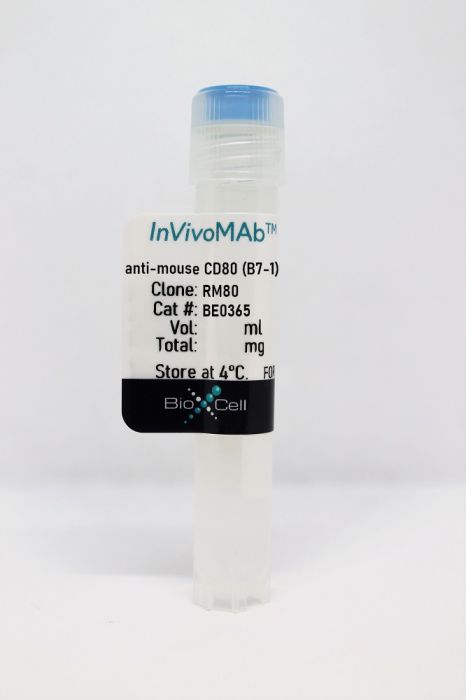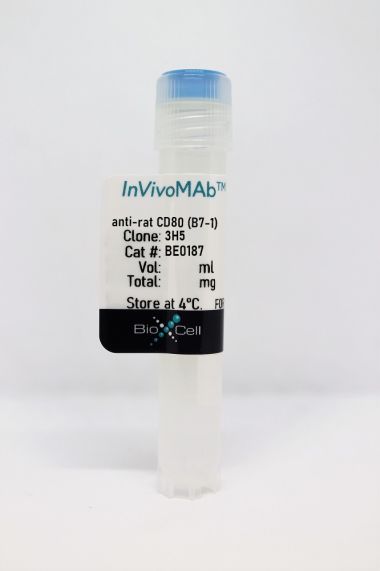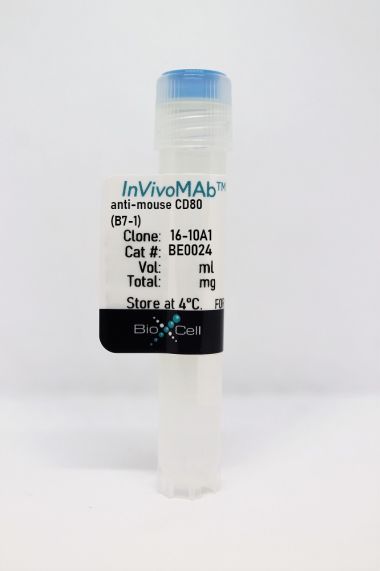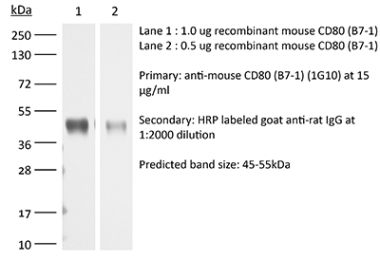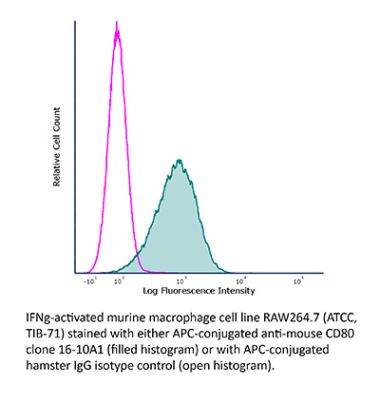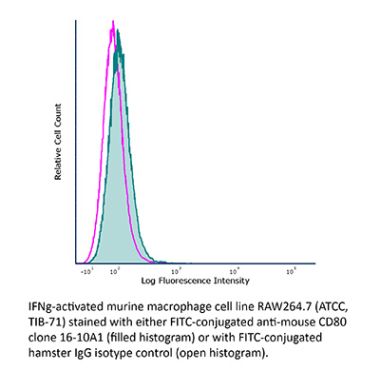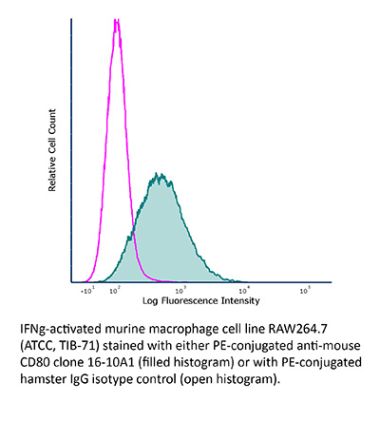InVivoMAb anti-mouse CD80 (B7-1)
Product Details
The RM80 monoclonal antibody reacts with mouse CD80 also known as B7-1. CD80 is a 60 kDa Ig superfamily member and is expressed by activated B cells and constitutively by monocytes and dendritic cells. This ligand binds to CD28 to provide a costimulatory signal necessary for T cell activation and survival, and cytokine production. Additionally, CD80 binds to CTLA-4 which inhibits T cells. This antibody has been shown to block CD80 in vivo.Specifications
| Isotype | Rat IgG2a |
|---|---|
| Recommended Isotype Control(s) | InVivoMAb rat IgG2a isotype control, anti-trinitrophenol |
| Recommended Dilution Buffer | InVivoPure pH 7.0 Dilution Buffer |
| Conjugation | This product is unconjugated. Conjugation is available via our Antibody Conjugation Services. |
| Immunogen | Mouse BCL1 cells expressing CD80 |
| Reported Applications |
in vivo CD80 blockade in vitro CD80 blockade Flow cytometry |
| Formulation |
PBS, pH 7.0 Contains no stabilizers or preservatives |
| Endotoxin |
<2EU/mg (<0.002EU/μg) Determined by LAL gel clotting assay |
| Purity |
>95% Determined by SDS-PAGE |
| Sterility | 0.2 µm filtration |
| Production | Purified from cell culture supernatant in an animal-free facility |
| Purification | Protein G |
| RRID | AB_2894783 |
| Molecular Weight | 150 kDa |
| Storage | The antibody solution should be stored at the stock concentration at 4°C. Do not freeze. |
Recommended Products
in vivo CD80 blockade
van der Gracht, E. T., et al. (2020). "Adenoviral vaccines promote protective tissue-resident memory T cell populations against cancer" J Immunother Cancer 8(2). PubMed
BACKGROUND: Adenoviral vectors emerged as important platforms for cancer immunotherapy. Vaccination with adenoviral vectors is promising in this respect, however, their specific mechanisms of action are not fully understood. Here, we assessed the development and maintenance of vaccine-induced tumor-specific CD8(+) T cells elicited upon immunization with adenoviral vectors. METHODS: Adenoviral vaccine vectors encoding the full-length E7 protein from human papilloma virus (HPV) or the immunodominant epitope from E7 were generated, and mice were immunized intravenously with different quantities (10(7), 10(8) or 10(9) infectious units). The magnitude, kinetics and tumor protection capacity of the induced vaccine-specific T cell responses were evaluated. RESULTS: The adenoviral vaccines elicited inflationary E7-specific memory CD8(+) T cell responses in a dose-dependent manner. The magnitude of these vaccine-specific CD8(+) T cells in the circulation related to the development of E7-specific CD8(+) tissue-resident memory T (TRM) cells, which were maintained for months in multiple tissues after vaccination. The vaccine-specific CD8(+) T cell responses conferred long-term protection against HPV-induced carcinomas in the skin and liver, and this protection required the induction and accumulation of CD8(+) TRM cells. Moreover, the formation of CD8(+) TRM cells could be enhanced by temporal targeting CD80/CD86 costimulatory interactions via CTLA-4 blockade early after immunization. CONCLUSIONS: Together, these data show that adenoviral vector-induced CD8(+) T cell inflation promotes protective TRM cell populations, and this can be enhanced by targeting CTLA-4.
in vivo CD80 blockade
Saegusa, K., et al. (2000). "Treatment with anti-CD86 costimulatory molecule prevents the autoimmune lesions in murine Sjögren's syndrome (SS) through up-regulated Th2 response" Clin Exp Immunol 119(2): 354-360. PubMed
Intraperitoneal administration with anti-CD86 (B7.2) MoAb into the murine model for primary SS in NFS/sld mutant mice resulted in dramatically inhibitory effects on the development of autoimmune lesions, while no significant effects were observed when the mice were administered with anti-CD80 (B7.1) MoAb. We found that spleen cells in the murine SS model treated with anti-CD86 MoAb showed a significant impairment of autoantigen-specific T cell proliferation. T cell activation markers (CD44high, CD45RBlow, Mel-14low) were significantly down-regulated in the spleen cells gated on CD4 in anti-CD86-treated mice. We detected a higher level of cytokine production of IL-4 from splenic T cells in anti-CD86-treated mice, but not of IL-2, and interferon-gamma (IFN-gamma), compared with those in the anti-CD80- and PBS-treated SS model. Moreover, serum autoantibody production against alpha-fodrin autoantigen was almost entirely suppressed in anti-CD86-treated mice. These data provide strong evidence that in autoimmune exocrinopathy resembling SS in NFS/sld mutant mice, the CD86 costimulatory molecule plays a crucial role in the initiation and subsequent progression of Th1-mediated autoimmunity in the salivary and lacrimal glands.
in vivo CD80 blockade, in vitro CD80 blockade, Flow Cytometry
Nakajima, A., et al. (1995). "Preferential dependence of autoantibody production in murine lupus on CD86 costimulatory molecule" Eur J Immunol 25(11): 3060-3069. PubMed
Blockade of the interactions between CD28/CTLA-4 and their ligands, CD80 (B7, B7.1)/CD86 (B70, B7.2), seems an attractive means to induce antigen-specific peripheral tolerance in organ transplantation and autoimmune disease. Recently, diversities between CD80 and CD86 in expression, regulation, and function have been reported in certain cell populations and murine experimental disease models. To investigate the possible differential role of CD80 and CD86 in the development of lupus, we treated lupus-prone NZB/W F1 mice with specific monoclonal antibodies (mAb) against CD80, CD86, or both. The treatment with a combination of anti-CD80 and CD86 mAb before the onset of lupus completely prevented autoantibody production and nephritis, and prolonged survival. Interestingly, we found that anti-CD86 mAb alone, but not anti-CD80 mAb, efficiently inhibited autoantibody production. Subclass study on IgG anti-double-stranded (ds) DNA antibody revealed that the treatment with anti-CD86 mAb almost completely inhibited both IgG1 and IgG2b, but not IgG2a production. The incomplete reduction of IgG2a anti-dsDNA antibody by anti-CD86 mAb was compensated by the addition of anti-CD80 mAb. A significant reduction of mRNA for interleukin (IL)-2, interferon-gamma, IL-4 and IL-6 was observed in mice treated with a combination of anti-CD80 and CD86 mAb or anti-CD86 mAb alone. Treatment with both mAb after the onset of lupus resulted in a significantly prolonged survival with reduction of autoantibody production. These results suggest that CD86 plays a more critical role in autoantibody production, and CD86, but not CD80, contributes to Th2-mediated Ig production. However, the blockade of both CD80 and CD86 are required for preventing the development and progression of lupus.

